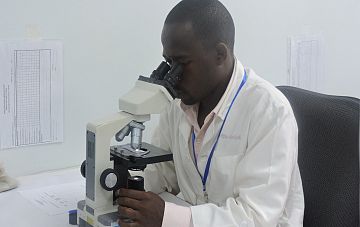COVID-19 less severe in people with high exposure to malaria, study suggests
26 October 2021
Ground-breaking research conducted by Malaria Consortium found that low previous malaria exposure seems to be associated with more severe manifestations of COVID-19. The results, published in full in The Lancet Microbe today following earlier preprint publication, were part of an investigation into the potential impact of previous malaria exposure on clinical profiles and outcomes of patients with COVID-19.
This preliminary descriptive investigation is the first to characterise potential interactions between SARS-COV-2 infection and malaria and describe important clinical correlates of coinfection in a high burden malaria setting.
Malaria causes significant morbidity and mortality with an estimated 229 million cases and 409,000 deaths reported globally in 2019 alone, over 90 percent of these in sub-Saharan Africa. The potential implications of any clinical interactions between COVID-19 and malaria infection is therefore a major public health concern in Africa, where the chances of co-infection is relatively high. The objective of the study was to better characterise COVID-19 cases in a high malaria burden setting and to determine the prevalence and describe the clinical consequences of SARS-CoV-2 and malaria co-infection.
“These preliminary observations enhance our understanding of potential clinical interactions between SARS-CoV-2 and malaria infection,” said Jane Achan, Senior Research Adviser at Malaria Consortium and co-author of this study. “Given the prevalence of malaria in sub-Saharan Africa, understanding the interactions and what this means for patient outcomes is of huge importance, and could help promote integrated approaches to investigations and management. Modelling done at the start of the pandemic predicted the potential consequences of COVID-19 on malaria deaths due to interrupted interventions, but little is known about the impact of co-infection on morbidity and mortality. It was important for us to be able to rapidly respond to a global need and contribute to better understanding the potential clinical implications of co-infections with other diseases like malaria.”
The study, conducted between April and October 2020, analysed the results of 597 patients of all ages with a confirmed diagnosis of SARS-CoV-2 at COVID-19 treatment centres in eight tertiary hospitals across North, East, South and North-Western regions of Uganda. To determine the level of malaria exposure in patients, the research measured the level of immune response to components of the malaria parasite (P. falciparum) at time of hospitalisation. A very strong immune response indicates high previous exposure to malaria either recently or over time and low or no evidence of a response indicates low previous exposure to malaria.
The proportion of patients with low previous exposure to malaria suffering severe or critical COVID-19 was 30.2 percent compared to only 5.4 percent of those with high previous exposure. The impact of low malaria exposure on the severity of COVID-19 remained even in patients without co-morbidities.
“The results suggest that if you’ve had a high previous exposure to malaria, you’re likely to control or manage COVID-19 better. Previous malaria exposure seems to play a role in the manifestation of COVID-19, possibly at an immunological level. The potential correlation between malaria exposure and COVID-19 may contribute to the reasons why the pandemic has not seen the same number of deaths from COVID-19 as was anticipated across Africa.”
The study also analysed the cytokine profiles of patients - small proteins that help the body’s immune and inflammation responses. Cytokine profiles in COVID-19 patients in low malaria burden settings have been well characterised, however, there has been limited data from high malaria burden settings. Results of this study showed relatively normal cytokine profiles among patients with high previous malaria exposure and those with a current malaria infection, suggesting some immune modulation or protective regulation at the immune system level that prevents severe manifestations of COVID-19.
The findings add value to the existing literature on SARS-CoV-2 epidemiology and clinical profiles in different settings. Indeed, a better understanding of the nature of interactions between SARS-COV-2 and malaria is of significant public health interest especially in sub-Saharan Africa given the epidemiological overlap between these diseases. In these settings, malaria prevention and control remain critically important in those at risk of malaria, including COVID-19 cases. Malaria Consortium is exploring options for further research to better understand this relationship, in particular pooling similar datasets from across Africa to provide a wider and more robust sample and undertaking longer-term follow up of patients to see how interaction impacts on the long-term outcomes of COVID-19 (long-COVID).
Malaria Consortium would like to take this opportunity to extend our special gratitude to the Ministry of Health, Uganda, and the patients, healthcare workers and laboratory teams involved in the study at all of the COVID-19 treatment centres for their contribution.
You can read more about the study here.
Latest news
- Malaria Consortium honoured by Ugandan government for contribution to combat malaria23rd April 2024
- International summit calls for AMR accountability in public health interventions21st March 2024
- Global SMC community celebrates new milestone at SMC Alliance Annual Meeting in Nigeria6th March 2024
- Scaling up key interventions could halve pneumonia-related childhood mortality13th February 2024
- Malaria Consortium and eGov Foundation join Mozambique’s national malaria programme to digitalise seasonal malaria chemoprevention campaigns8th February 2024
- World’s first malaria vaccine rollout launched in Cameroon22nd January 2024